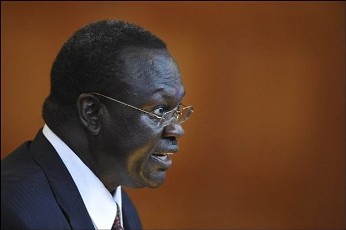“Don’t register if you cannot vote,” Sudan’s Machar cautions
August 25, 2010 (JUBA) — The Vice President of the semi-autonomous Government of Southern Sudan (GoSS) Riek Machar has cautioned potential voters not to only register, but also vote during the referendum’s seven-day voting exercise scheduled to starting on January 9, 2011.

In his generalized statement to all civil society organizations that will take part in the mobilization for registration and civic education, the Vice President told them to equally mobilize for registration as well as for voting in order to meet the 60% threshold of registered voters as required by the referendum law.
He said those that feel they may not vote during the referendum should not register in the first place because that would harm the needed turnout.
“Don’t register if you cannot vote,” he said in his remarks targeting potential voters.
According to the law, at least 60% of all the registered voters must vote in the referendum in order to recognize the outcome of the exercise. Also, 50%+1 of the voted – minus spoiled votes – shall be required in favour of either unity or secession option in order to declare it the winning choice of the people.
Machar also stressed the importance of conducting civic education to the people on how to vote throughout the region.
“This is to avoid the issue of spoiled votes which ballot papers may not be properly marked and would affect the 60% threshold,” he said.
He revealed that during the voting there will not be two boxes but only one box and one ballot paper with two different symbols; one for unity and another for secession. The selection of symbols will be done by the Southern Sudan Referendum Commission, he said, adding that it is important for the population to be educated about the type of symbol representing each option.
The referendum law has provided for a re-run of referendum voting after 60 days of the original vote date if the 60% turnout was not be achieved in the first round. Machar however said it would be best that the required turnout would materialize in the first round, warning that if it failed, going for the second round would be difficult because it could generate a debate on the justification.
Machar also stressed the need for making the vote transparent, free and fair, explaining that despite the fact that it will be the people of Southern Sudan voting, the referendum is not only about Southern Sudan, but a national act since it will determine the fate of the whole country.
“Somebody in Halfa – a northerner – would want to assure himself or herself that the outcome of the referendum is the free will of the people of Southern Sudan and not manipulated by anybody,” he said.
South Sudan’s VP also cautioned that challenges faced during the April elections should not be repeated, adding that there should be a better way of finding polling stations and writing names correctly.
The Chief Internal Coordinator and co-organizer of the workshop, Lokulenge Lole, told participants that the issue of referendum “is a matter of life and death” and should be taken seriously by all to bring the freedom of the people of Southern Sudan.
Meanwhile the Chairperson of the SPLM parliamentary Caucus and Chief Whip in the Southern Sudan Legislative Assembly, Peter Bashir Gbandi, said the current elected parliament is a “referendum parliament,” and warned that any attempt to obstruct the conduct of the referendum by any party can lead to the Southern Sudan parliament taking over the process on behalf of the people of Southern Sudan.
Gbandi said lawmakers would pass the referendum Taskforce’s budget this week, urging that the amount should not be limited to only 150 million Sudanese pounds but should instead be left open without a ceiling.
Machar on the other hand also briefed the workshop on the ongoing activities of the referendum Taskforce, which he chairs, explaining that the Taskforce will work in cooperation or in coordination with the civil society organizations and support them in playing the role of civic education and mobilization for registration and voting. The budget for the work of the Taskforce is expected to be passed by the parliament this week, he said.
The Vice President told the civil society organizations to freely debate on the two options of unity and secession, adding that while the option for secession is “clear”, there should be issues tackled on the option of unity.
Machar, who seemed to challenge voices from the North that only interpret or focus on the phrase “making unity attractive” in terms of only developing physical infrastructure in the country, said even if the regional capital, Juba, were to be miraculously made to look like Dubai in the next five months to referendum, it would not be enough to attract unity because other issues of justice, governance, accountability and mutual respect, among others, would also have to be tackled first in order to make it an attractive option.
Doubts have been raised on whether the newly formed referendum commission would be able to fulfil its mandate by January given the delay in getting it up and running as well as dispute over appointing a secretary general.
(ST)
